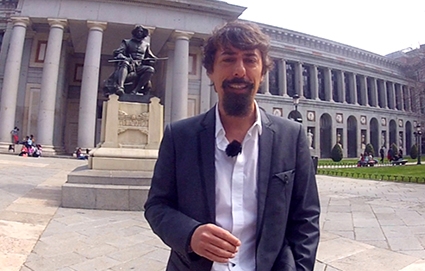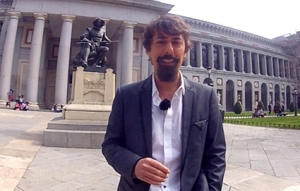McCarthy: I See a Hunger to Take Off in Georgia
Andrew McCarthy, an Academic Director at the IE School of Human Science and Technology in Madrid, a man regarded as a guru of innovation, with numerous start-ups to his name who has been a consult to such corporations as BBVA, Google Spain, Adidas, MTV Productions, Paramount, and BP, held a lecture in Marriott Tbilisi Hotel this Saturday.
GEORGIA TODAY met with Professor McCarthy after the lecture to speak about his views on financial innovations and how they will shape our future.
What do you think the role of banks as financial institutions will be with technology changing so fast?
The question of how the financial institutions, or finance service organizations, operate is really changing with the rise of internet, and of artificial intelligence and connectivity. There are going to be different models of how we interact with objects, and with objects as services. iTunes and the App store are perfect examples of this- micro transactions: all I need to pay for an App is my fingerprint. It doesn’t feel like a monetary transaction, but it is. So, the producers are going to be investing much more in that. Again, with the rise of automated currency, if we’re better able to automate the entire process coming out of a manufacturer, what do we need a finance company for? Or, if we look at it from the perspective of the finance company, what value can we offer? Where do we deliver value and how can we then partner with a manufacturer, for example? They will have to rely a lot more on collaborative partnerships and alliances.
Will it be challenging for them to do so?
I think it’ll be incredibly challenging. I think they’re going to have to change the way they think about their own experience and institutional knowledge, maybe what they are good at in this example is large movements of financial resources and so perhaps they could partner with manufacturers in micro transactions as a way to provide a service managing or trafficking flow. It’s going to require lots of reflection, a lot of self-inquisition.
Why do you think advanced financial technologies are beneficial to customers and what future tendencies can you highlight?
Well, we’re still trying to understand it and how our behaviour can be affected by it; to realize how it can help us do a job, or satisfy a need or requirement.
Is it safe?
Let me answer that question from a different angle. There’s an organization called Code For America, it’s quite old now and the way it operates is as an agile, nimble programming team. It’s very responsive, experimental, very informative, and it works very fast. They are also very tight with government, and are well-connected. What they’re doing is acting as a third party to provide solutions for people: they’ve launched and run programs for food assistance for example, helping people to stay out of the justice system for small things, like not paying a fine, etc… and they can operate like a modern development crew because they are not the government but they provide services for the government.
Some of the fundamental regulations and laws that govern how digital is done in American government were written quite some time ago. It could not predict any of the way we operate now and yet it has some very smart laws, some of them even good for personal safety now. Yet they inhibit the kind of responsive, proactive, people-centered innovation that is possible and necessary. The question of safety should always be a paramount question.
Although innovative services are widely used in Georgia, it is often a challenge for the elder generation to work with them.
That’s not their fault, that’s the failure of the people working in that sphere, and again, it comes back to design. When we talk about design that is focused on people, be it consumer or customer, there’s a great phrase in civil architecture and design that “it should be 99 percent invisible”- it should just work. And if the older generation is tensing up, that’s because it’s not working. We may need a different solution; we may need multiple solutions, because if we’re trying to change culture, we can’t have just one brute force attempt, because the way we people interact, the way we group ourselves or segregate ourselves, is far more complex.
Where do you think Georgia stands in terms of innovations?
My brief impression is incredibly hopeful. I’ve been really impressed [during my visit], particularly with the attitude to innovation. I went to TBC Bank and met with people there who were engaged and very interested.
I also spoke to clients of Bank of Georgia and found them equally switched on. I get the impression that this is the challenge that people are living in, engaged in. You have to believe that you can make change, that you can respond to a challenge in a postive way, that you can deliver some value to someone’s life. Of course like Spain, Georgia has economic problems, movement is difficult, regulations are difficult, we’re dealing with the historic baggage of organizational structures, etc… but what I see is a hunger to take off.
What difficulties do you foresee for implementing changes?
I would say stay in power and endorse, because these are marathons, not sprints. We have to address the small things first and build up from there.
What does creativity mean to you personally and can it be taught?
No, in a lot of ways it can’t…. I’m teaching the unteachable. I don’t know if it can be taught but I know it can be learned. Learning is a personal journey, a personal transformation; a sort of realization process. I’m really fascinated with neuroscience and this is the golden age of investigation into the brain and how lots of things happen- many white papers published are on the process of thought, ideas and creativity. Creativity is thinking something that you haven’t thought before. Because I’m engaged in education and facilitating practices and activities, I can say for sure that the process of creativity isn’t finished until you have something out and you’ve shared it.
Nino Gugunishvili











